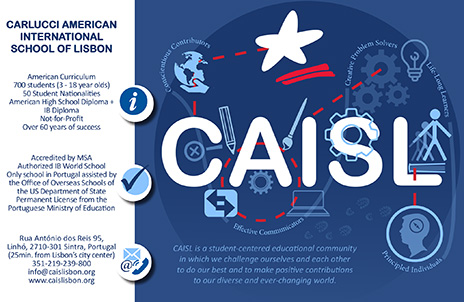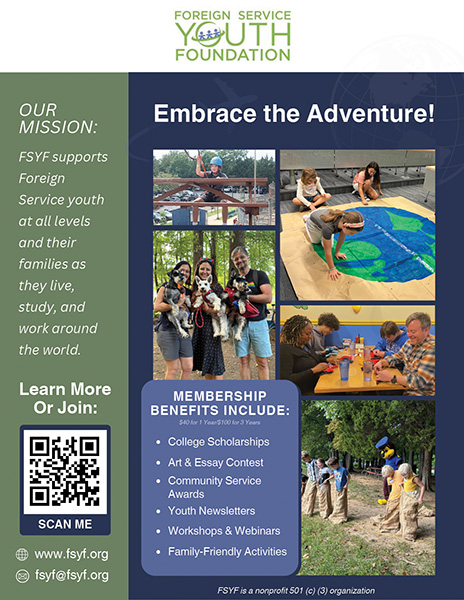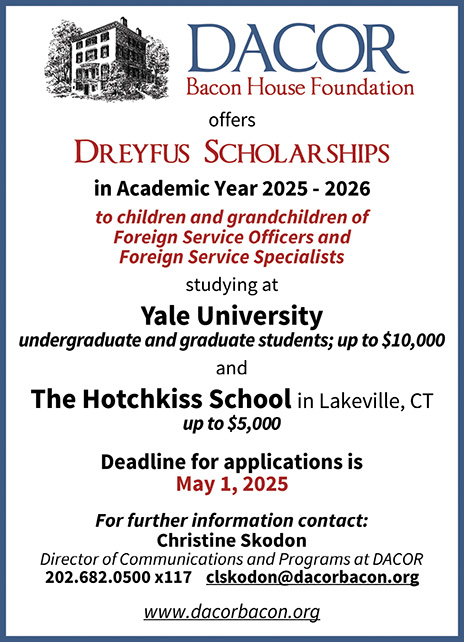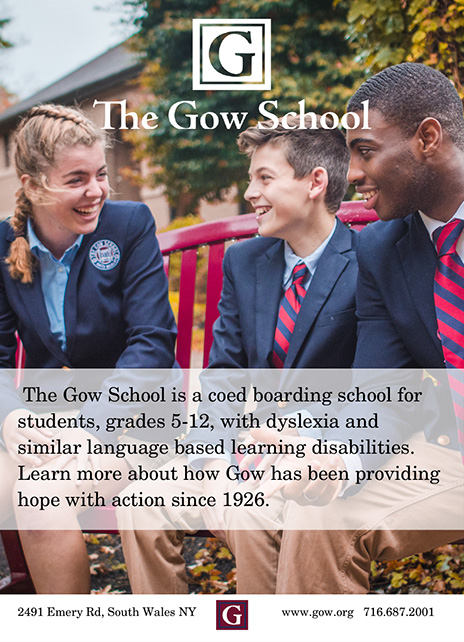2024 Awards for Exemplary Performance
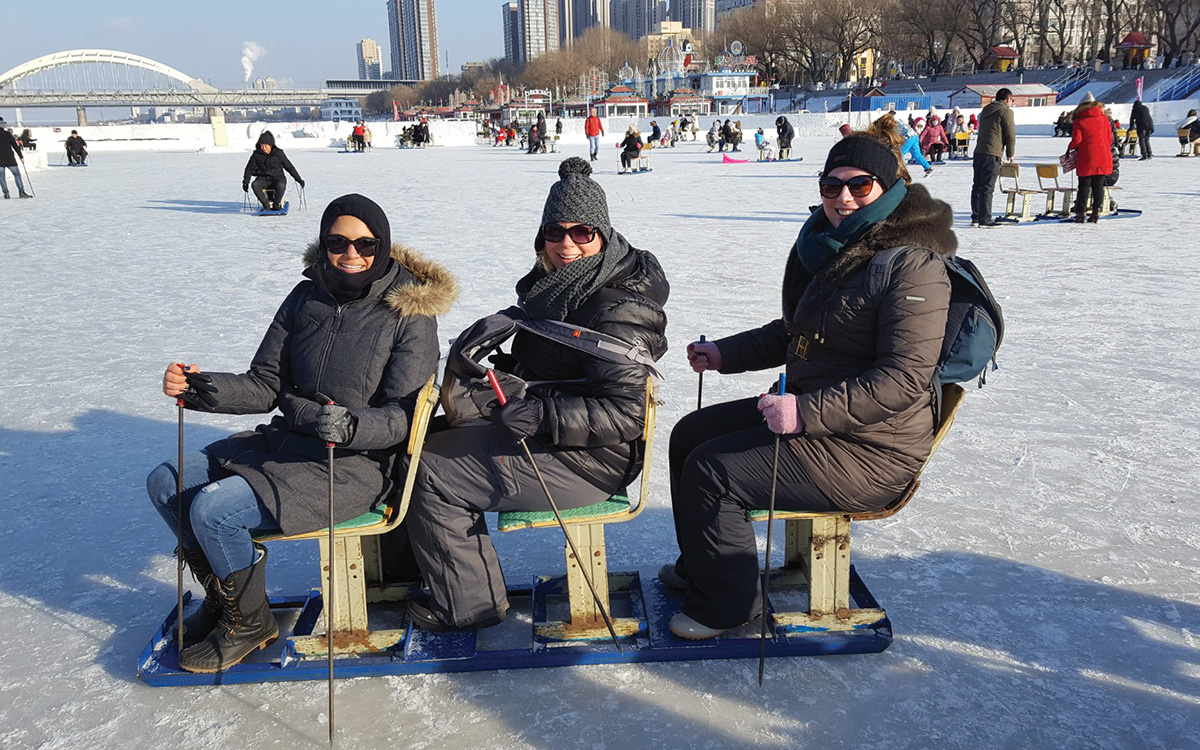
Dana Sutcliffe (left) with her Foreign Service colleagues visiting the Ice Festival in Harbin, China.
Nelson B. Delavan Award for a Foreign Service Office Management Specialist
Dana Sutcliffe: Champion of Efficiency and Morale
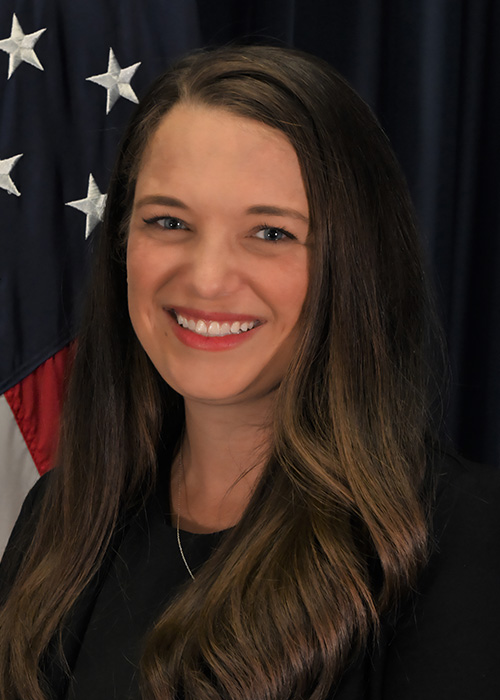
Dana Sutcliffe
Dana Sutcliffe has been named the 2024 winner of AFSA’s Nelson B. Delavan Award for her exemplary work at U.S. Embassy Tegucigalpa. As the office management specialist (OMS) to Ambassador Laura Dogu, Sutcliffe has focused on enhancing operational efficiency, fostering innovation, and building a stronger community.
One of her most important contributions was the development of a new collaborative tasking tool, called the Embassy Tegucigalpa Collaboration Team, that revolutionized how agencies and offices within the State Department work together by streamlining processes, eliminating the need for email attachments and paper, and facilitating immediate, effective communication. The tool has been widely adopted across 40 posts and was even mentioned in Secretary of State Antony Blinken’s Modernization Agenda.
“Miraculously, she connected all agencies despite technological challenges,” says Ambassador Dogu. “This multipronged tool allows immediate collaboration and conversation, flattens the organizational structure, moves items requiring clearance along much more quickly, and prioritizes pending work for the deputy chief of mission and ambassador—all without email attachments or paper.”
In addition to her technical innovations, Sutcliffe has excelled in leadership and management within the front office support team. She focused on upgrading positions, prioritizing staff education, and creating detailed standard operating procedures to ensure seamless operations even in her absence. Her approach has fostered a high-performance, high-morale team that supports the smooth functioning of the large interagency embassy team.
As co-chair of the embassy’s employee association, she played a pivotal role in reviving community spirit following the challenges of the COVID-19 pandemic. When Honduras lifted its mask mandate in March 2023, Sutcliffe’s team used the embassy garden to host events, bringing back a sense of community and significantly raising post and community morale.
An active member of the Diversity, Equity, Inclusion, and Accessibility (DEIA) Council, Sutcliffe headed Leadership Lab activities to encourage each office and agency to develop a capstone project.
Receiving this award is deeply meaningful to me on both a personal and professional level. It represents a recognition of the hard work, dedication, and passion I bring to my role every day.
–Dana Sutcliffe
Recognizing that American staff traditionally had more access to senior leaders, she suggested and implemented monthly meetings between new locally employed staff and the ambassador and deputy chief of mission. “Local staff commented on how welcome they felt as they began their new careers at the embassy,” one colleague shared. “This initiative improved teamwork and morale across all agencies of the mission.”
Sutcliffe also served on a recruitment panel, encouraging more than 700 potential candidates to join the State Department. As a subject matter expert for the Board of Examiners and an assessor, she ensured that the hiring process reflects the evolving complexities of the OMS role and that new hires possess the necessary qualifications. “She is shaping the future by building a more modern, diverse, and inclusive institution with the most qualified individuals,” a supervisor remarked.
“Receiving this award is deeply meaningful to me on both a personal and professional level,” Sutcliffe says. “It symbolizes the collective effort of a team and the supportive environment we’ve cultivated at Embassy Tegucigalpa.”
She adds: “This award acknowledges the impact of our collaborative initiatives, the advancements we’ve made in streamlining operations, and the commitment to fostering a positive and inclusive work environment. It motivates me to keep pushing boundaries and exploring new ways to contribute to the Department of State’s goals.”
Sutcliffe joined the State Department Foreign Service in 2016. She has served in Managua, Shanghai, and Mexico City, as well as serving on a five-month bridge assignment with Diplomatic Security’s COVID-19 response team.
Before joining State, she worked as an executive assistant and event planner for a private equity firm in Chicago, Illinois. She holds a bachelor’s degree in international business and Spanish from Valparaiso University. Originally from Holland, Michigan, Sutcliffe is married with two children.
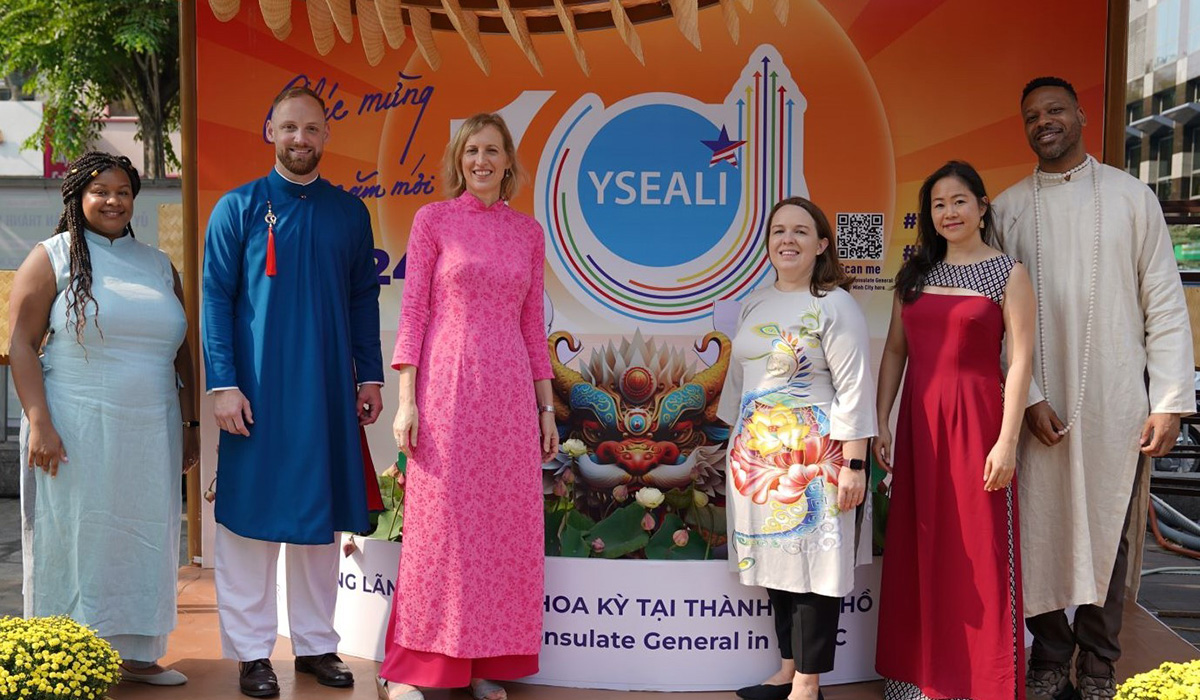
Diana Trinh (in red) at the U.S. Consulate General booth at the HCMC Lunar New Year Flower Festival.
Nelson B. Delavan Award for Foreign Service Office Management Specialist (Runner-Up)
Diana H. Trinh: Mentor, Leader, Advocate
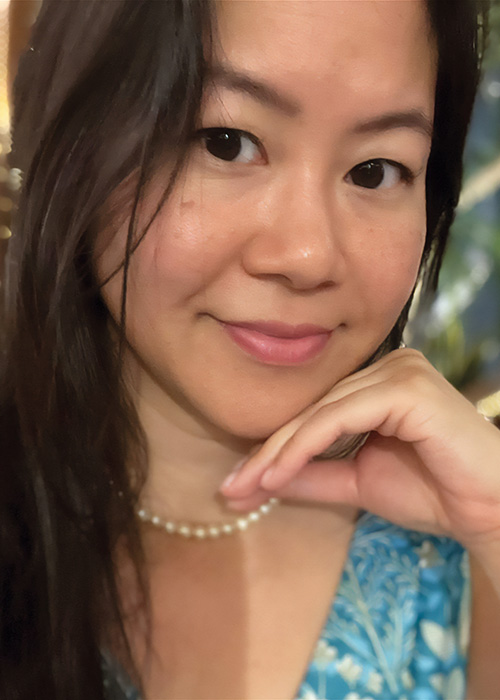
Diana H. Trinh
Diana H. Trinh, executive office manager at the U.S. consulate general in Ho Chi Minh City, has been recognized as the runner-up for the 2024 Nelson B. Delavan Award. Her dedication to community building; diversity, equity, inclusion, and accessibility (DEIA) efforts; and professional mentorship has improved morale and effectiveness at her post, reflecting the core values of an office management specialist (OMS).
As the sole OMS at the U.S. consulate general in Ho Chi Minh City for the past four years, Trinh has had the unique opportunity to build relationships with staff across post, mentor 20 first- and second-tour (FAST) officers, and guide senior officers when they take on acting roles in the executive office. She has also led essential training sessions on administrative procedures, supported postwide committees, and contributed to community events.
“I love being an office management specialist!” Trinh says. “Most of us get the opportunity to work in a front office during our first tour, and we are entrusted with this responsibility because we are hired with the skills, knowledge, and abilities to make a significant positive impact at our posts. Our specialty is making the office run effectively and efficiently. For me, this includes paying attention to morale and doing what I can to make sure our workplace is an inclusive environment where staff thrive.”
As co-chair of the post’s DEIA Council, she won the inaugural Bureau of East Asian and Pacific Affairs’ Secretary Colin L. Powell DEIA Award in 2023 for her outstanding work leading the popular DEIA Buddy Program, which paired American and Vietnamese staff to promote cultural understanding and create a respectful work environment. After passing on her leadership role, Trinh has remained an active advocate, organizing Locally Employed Staff Appreciation Day and ensuring that all team members are recognized for their contributions.
Mission Vietnam had a particularly demanding year, with an influx of visitors and a visit by President Joe Biden to mark a strengthening of U.S.-Vietnam relations. Trinh’s ability to keep the consulate running smoothly during such high-profile events exemplifies her organizational skills, leadership, and proactive approach.
She led the consulate’s transition to a cloud-based document management system, reducing issues with version control and promoting collaboration across the team. Her success in Ho Chi Minh City even inspired U.S. Embassy Hanoi to adopt a similar system.
Trinh’s efforts have gone beyond her OMS responsibilities. Her mentorship has been a driving force behind the success of many at the consulate, with colleagues—from newly hired officers to acting consul generals—regularly seeking her counsel.
“I am delighted to have been selected as an honorable mention for the 2024 Nelson B. Delavan Award. It’s extremely rewarding to be recognized for the work we OMSes do to improve our workplaces,” Trinh says.
Trinh joined the State Department Foreign Service in 2016. She has also served at the U.S. Mission to the Organization for Economic Cooperation and Development in Paris and at U.S. Embassy Addis Ababa.
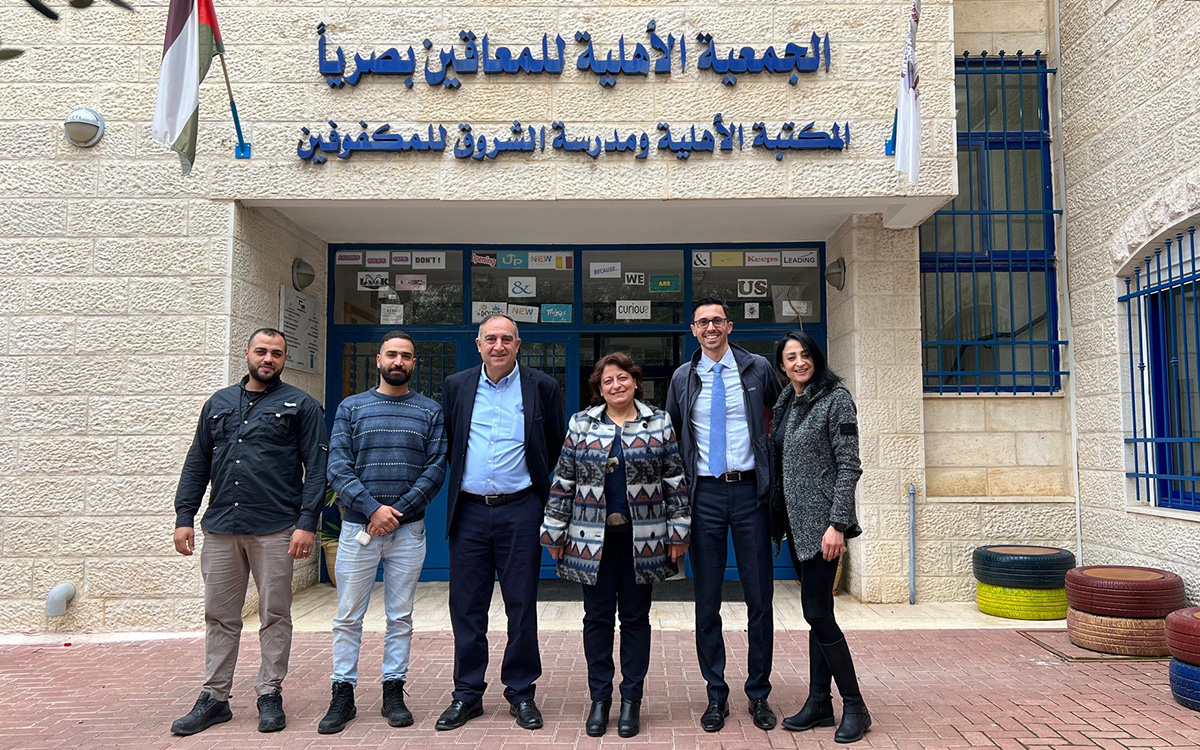
Christophe Paccard (second from right) at a charity event for the Al-Shurooq school in Beit Jala, West Bank.
M. Juanita Guess Award for a Community Liaison Office Coordinator
Christophe J. Paccard and Sherri Zimmermann: Excellence in Crisis Leadership
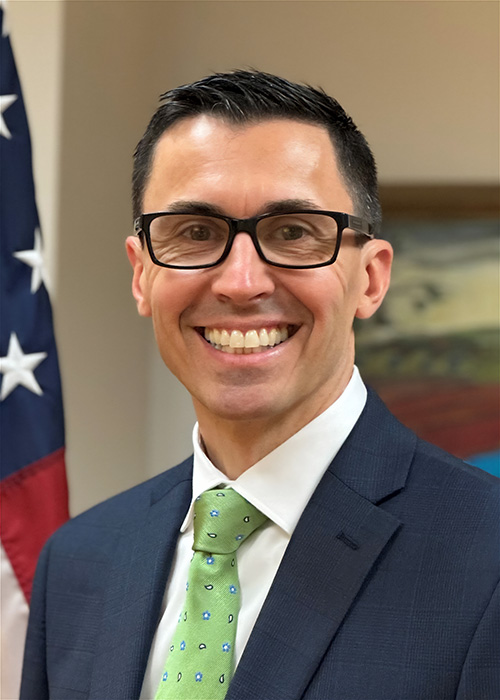
Christophe Paccard
The 2024 M. Juanita Guess Award honors two outstanding community liaison office coordinators (CLOs), Foreign Service family members Sherri Zimmermann in Tel Aviv and Christophe J. Paccard in Jerusalem, for their exceptional leadership, dedication, and service during the aftermath of the Oct. 7, 2023, Hamas terrorist attack on Israel.
Their remarkable coordination and care in one of the most difficult periods in recent history brought essential relief to their embassy communities, both in Israel and abroad.
Zimmermann recalls the fear and confusion of that morning. “The sirens began at around 6:30 a.m.,” she remembers. “My husband and I grabbed our go-bags and headed to the shelter, uncertain of what was happening.” The days blurred together as she and her team worked around the clock, offering emotional support, organizing town halls, and ensuring that the embassy community had access to vital resources. Zimmermann also revamped the CLO Tel Aviv WordPress site to ensure that comprehensive crisis information was available to all—an invaluable tool in the chaos that followed.
Once Washington authorized the departure of eligible family members (EFMs) on Oct. 15, Zimmermann’s work did not slow down. As large portions of the community left on authorized departure (AD), she remained at post, ensuring that those who stayed were cared for and offering valuable feedback on the pulse of the community to Front Office leadership.
She organized events to boost morale, hosted virtual meetings, and provided crucial updates on both the conflict and available support. Her thoughtful planning resulted in events that brought moments of normalcy amid the uncertainty, maintaining a strong sense of community among those remaining at post.
We worked around the clock, cared for our community, and cared for each other. This award is a profound honor, and I’m grateful to be receiving it alongside Sherri.
–Christophe Paccard
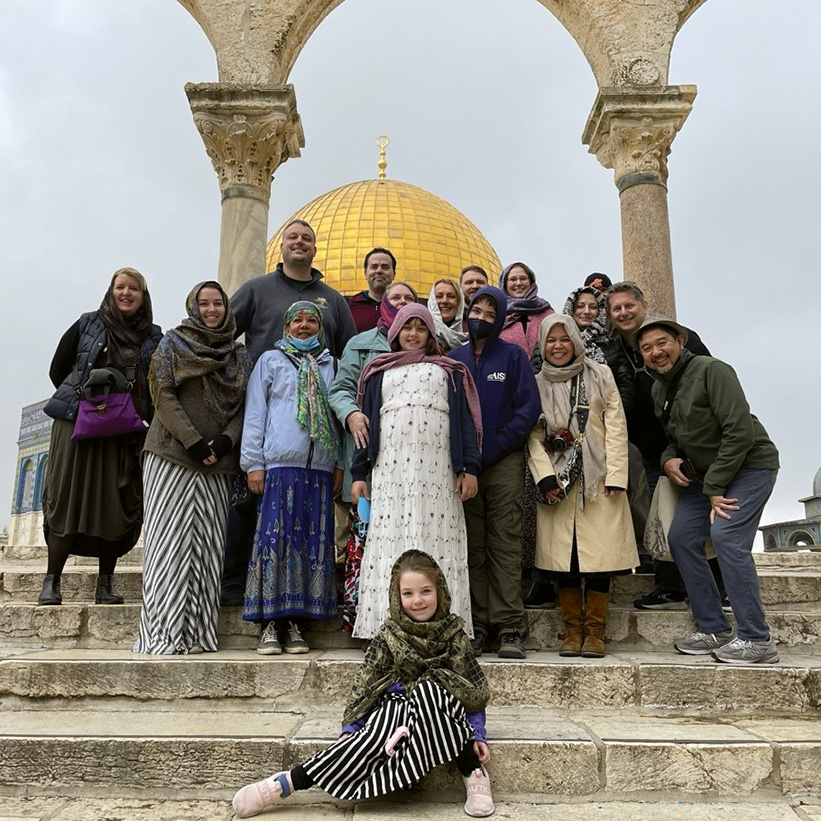
Sherri Zimmermann on a CLO trip at the Dome of the Rock in Jerusalem.
Paccard’s leadership in Jerusalem after the Oct. 7 attack was also essential in helping the embassy and consulate community navigate the chaos and uncertainty. As rockets rained down and the community was forced into bomb shelters, Paccard became a vital point of contact. His calm demeanor and ability to anticipate community needs ensured that families had the support they needed during this unprecedented crisis.
When AD began, Paccard stayed behind to assist with repatriating others back to the U.S. and ensuring that all those wishing to remain in Jerusalem were accommodated. He and his spouse departed for Washington, D.C., six days later.
Paccard’s work did not stop there. From Washington, Paccard organized events and maintained daily communication with families on AD, ensuring they felt connected and supported. His quick thinking even saved the life of a community member who had remained behind in Jerusalem and fell gravely ill. Paccard used his established contacts to facilitate the member’s emergency hospital admission, a critical intervention that saved their life.
Despite the seven-hour time difference, Paccard and Zimmermann stayed in constant communication throughout the 2.5-month AD period, ensuring that both groups—the families who stayed at post and those who left—felt informed, connected, and supported.
 §
§
For Zimmermann, this marked the second time she served in the role of CLO. Her first tour as CLO was at U.S. Embassy London from 2015 to 2018, where the community also experienced multiple terror attacks. This tour at U.S. Embassy Jerusalem’s Embassy Branch Office in Tel Aviv began in 2020 with COVID-19 and lasted through July 2024, ending with the Israel-Hamas war. Her spouse, David Zimmermann, was an FBI supervisory special agent at both posts.
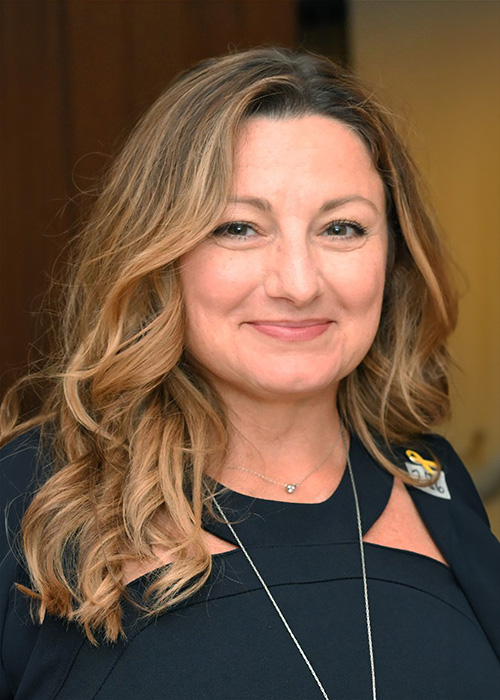
Sherri Zimmermann
Before moving overseas, Zimmermann worked as a community engagement coordinator for a private nonprofit in Charlotte, North Carolina. Prior to that she worked as coordinator of volunteer services for a nonprofit in the Jewish community. A graduate of Texas A&M University and Troy State University, she holds both a bachelor’s in speech communication and a master’s in counseling and human development. She felt that serving as CLO epitomized her education and experience and is grateful for having had the opportunity.
For Paccard, the award is the culmination of years of service and dedication to the embassy community. He was born and raised in a small village in the French Alps. After earning a BA in hospitality, he moved to London in 1997 to improve his English and pursue his career. By 2000 he had relocated to New York, where he worked in the luxury hotel industry.
In 2001 Paccard moved to Washington, D.C., and eventually received sponsorship for a green card. He became a permanent resident in 2012 and, two years later, a U.S. citizen. During this time, Paccard joined his husband, a Foreign Service officer, on assignment in Caracas, where Paccard began his first of four tours as a CLO. He and his spouse have served in Reykjavík, Algiers, Jerusalem, and Port Louis, Mauritius, where he worked as the regional security office manager.
Now back in Washington, Paccard works in the Office of the Chief of Protocol, a position that blends his extensive experience in the Foreign Service community with his hospitality expertise. Throughout his career, Paccard’s focus has always been on serving others and lifting the spirits of those around him, which is at the heart of the work he does.
“We worked around the clock, cared for our community, and cared for each other,” he says. “This award is a profound honor, and I’m grateful to be receiving it alongside Sherri.”
The contributions Sherri Zimmermann and Christophe J. Paccard made to their community were nothing short of heroic. Their leadership and teamwork exemplify the very spirit of the M. Juanita Guess Award, honoring community liaison office coordinators who go above and beyond in times of need. Their work demonstrates what it means to lead with empathy, dedication, and a sense of service.
Avis Bohlen Award for a Foreign Service Family Member
Cornell Overfield: From Stray Cats to Civil Society
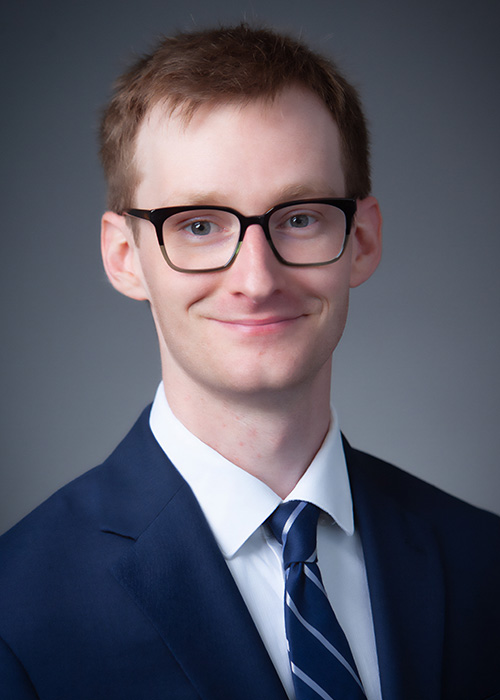
Cornell Overfield
The 2024 Avis Bohlen Award, which honors family members of Foreign Service employees whose efforts advance U.S. interests abroad, has been awarded to Cornell Overfield for his transformative work in Bishkek, Kyrgyzstan.
Overfield’s initiative, the “Mishek Ui” (Cat Home) project, was the first of its kind in the Central Asian capital, addressing the city’s growing stray cat population through humane, sustainable methods.
Overfield’s journey as a Foreign Service family member began in 2021, though he also spent part of his childhood at U.S. embassies in Abuja and Gaborone as the child of a U.S. Army foreign area officer.
His first assignment with his wife, Cultural Affairs Officer Miranda Lupion, brought him to Bishkek, where he quickly immersed himself in the local culture. In addition to his professional work as a research analyst for the Center for Naval Analyses, with articles published in Foreign Policy and Lawfare on the law of the sea and national strategy, Overfield spent his time volunteering with local animal rescue groups.
Shortly after arriving in Bishkek, Overfield connected with the city’s leading animal rescue group. He was struck by the dedication of local women, who worked tirelessly to save animals in distress.
Many of the volunteers were retirees, affectionately known as babushki, or “grandmas,” who used their modest pensions to feed the ever-growing number of stray cats in the city.
Tragically, the volunteers explained, many of these strays perished during the harsh Kyrgyz winters or faced even worse fates at the hands of animal control. These conversations, coupled with Overfield’s own past experiences caring for street cats, inspired the idea for the Mishek Ui project.
This prize means so much to me and, more importantly, to our partners in the Bishkek cat community: the vet faculty and students at the Kyrgyz-Turkish Manas University, the local rescue groups and volunteers, and our embassy colleagues. Their efforts helped us far exceed our initial goals.
–Cornell Overfield
The project’s mission was simple: humanely reduce the stray cat population through a Trap-Neuter-Release (TNR) program, and build low-cost, winterized shelters to increase the cats’ chances of surviving Bishkek’s brutal winters.
Overfield partnered with one of the city’s top veterinary schools, the Kyrgyz-Turkish Manas University, and local animal welfare advocates to make his vision a reality. Together, they drafted a proposal and secured a small grant from the J. Kirby Simon Foreign Service Trust.
With this support, the team got to work. Local volunteers, including embassy staff, caught up to seven cats a day, which received anti-parasitic treatments and sterilization surgery from 30 veterinary students, who gained valuable clinical experience in the process. The project also built 32 winterized cat homes in just one afternoon, using cost-effective materials provided by a local wholesaler.
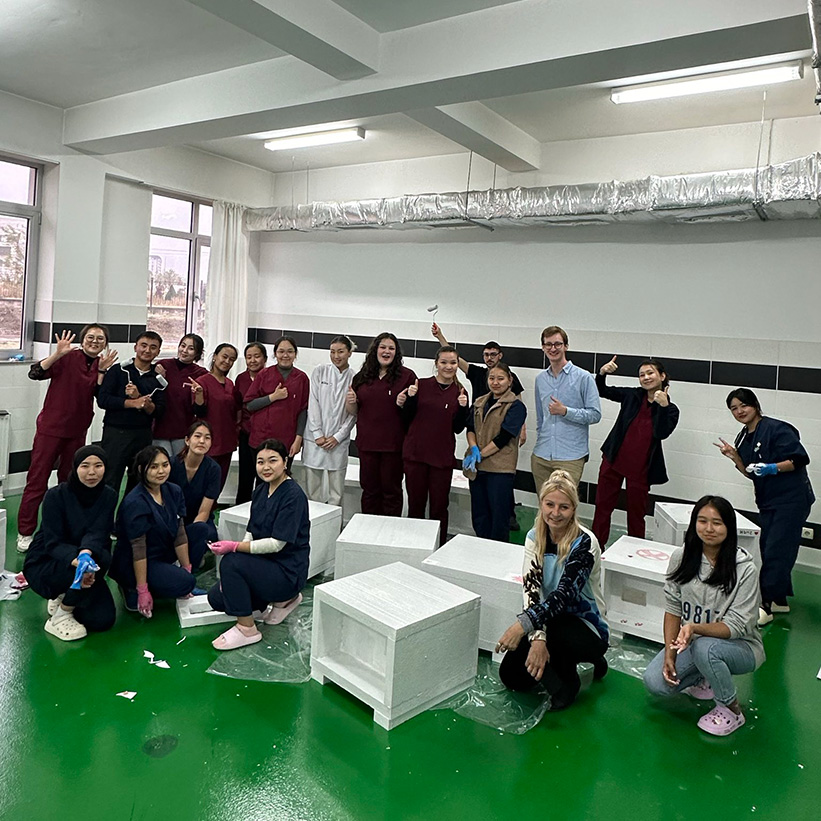
Cornell Overfield and his team of local volunteers building winterized cat homes.
Embassy staff volunteers translated instructional cards into Russian and Kyrgyz, which were laminated and attached to the shelters. The shelters were then delivered to residents of Bishkek and surrounding villages, who monitored local cat colonies.
The Mishek Ui project quickly surpassed expectations. In just two months, the team treated approximately 150 cats, far exceeding their initial goal. At the closing ceremony, the enthusiastic participants asked a single question: “When can we resume work next spring?”
Overfield was scheduled to depart post, but before leaving, he passed on his contacts and knowledge to another dedicated embassy colleague. The local coalition continues to meet and expand the work.
Reflecting on his achievements from his new home in Frankfurt, Overfield says: “This prize means so much to me and, more importantly, to our partners in the Bishkek cat community: the vet faculty and students at the Kyrgyz-Turkish Manas University, the local rescue groups and volunteers, and our embassy colleagues. Their efforts helped us far exceed our initial goals.”
Overfield plans to use the money from the Bohlen award to help volunteers in Bishkek continue the important work he started. With funding in place, the coalition plans to resume the program this fall, just as the vet students return to school. Overfield’s work has already begun reducing Bishkek’s stray cat population while improving local health outcomes by limiting the spread of disease.
But Overfield’s impact goes far beyond animal welfare. His project fostered meaningful relationships between the U.S. embassy, local veterinary students, and animal rescue advocates, demonstrating the power of grassroots efforts in uniting communities.
His work reflects the best of what American diplomacy has to offer: creativity, compassion, and an unwavering belief in the power of collaboration.
Mark Palmer Award for the Advancement of Democracy
Paul Estrada: Strengthening Democracy Amid Russia’s War Against Ukraine
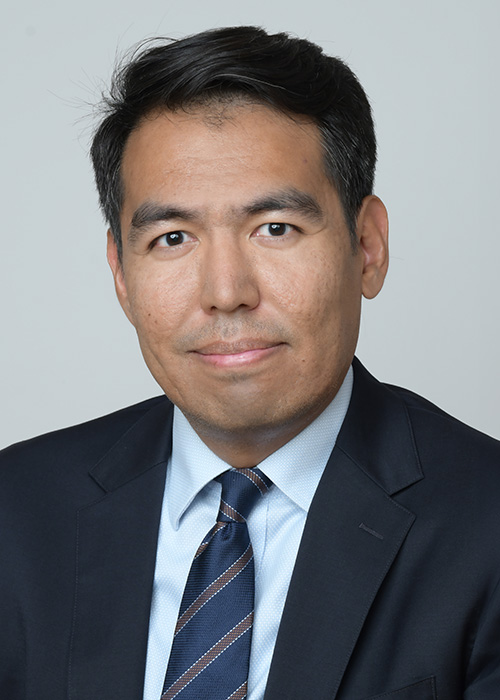
Paul Estrada
Foreign Service Officer Paul Estrada was given the Mark Palmer Award for the Advancement of Democracy in 2024 in recognition of his bold, creative, and effective leadership on the Ukraine desk as the country defended its sovereignty, territorial integrity, and independence. Assigned to the Ukraine desk from 2022 to 2024, through his work, he helped significantly strengthen Ukraine’s democracy in the face of Russia’s full-scale invasion.
Estrada’s strategic work across various offices within the State Department, in collaboration with U.S. Embassy Kyiv and interagency partners, was pivotal in directing $22.9 billion in U.S. direct budget support to Ukraine. His focus on leveraging this substantial aid to help Ukraine win the war and, as he told the FSJ, to “win the future” through advancing anti-corruption and other essential reforms showcases his commitment to democratic governance.
As the Bureau of European and Eurasian Affairs’ lead action officer for recovery and reforms in Ukraine, Estrada was instrumental in developing guidelines for U.S. budget support for Ukraine in light of Russia’s full-scale invasion. Crafting meticulous démarches for delivery to the highest levels of the Ukrainian government, Estrada articulated the U.S. rationale, held firm on positions, and ensured that expectations and decision-making metrics were clear.
His leadership during discussions between Embassy Kyiv, the National Security Council, and senior leadership at the State and Treasury Departments guaranteed maximum effectiveness for the U.S. government’s investment.
One of Estrada’s most notable achievements was consolidating reforms the U.S. government sought from Ukraine, encompassing fiscal, anti-corruption, defense, and judicial reforms. This was a Herculean task, requiring extensive coordination and development of consensus among diverse interagency views.
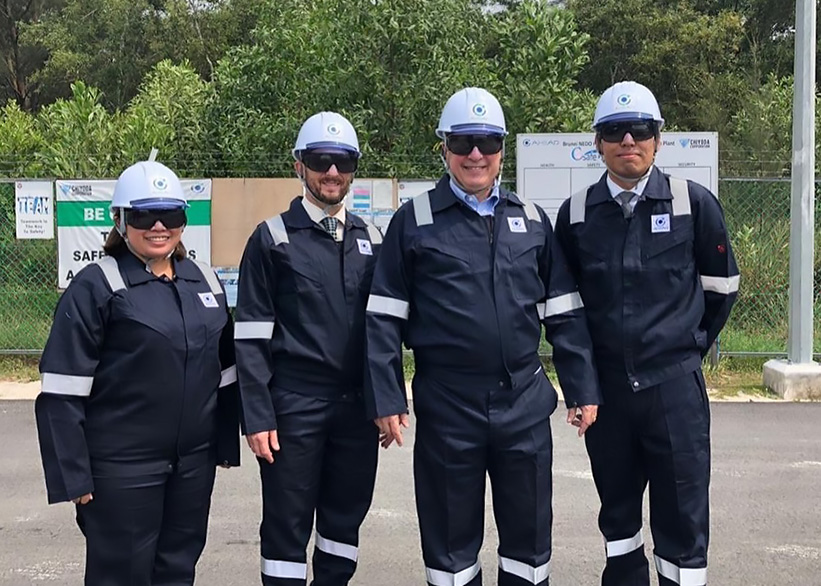
Paul Estrada (far right) visiting a hydrogen demonstration plant in Brunei with the late Ambassador Matt Matthews (second from right).
U.S. Embassy Bandar Seri Begawan
His tireless stewardship resulted in an enduring tool that aligns messaging by senior officials with Ukrainian interlocutors and influences other donors’ plans.
The secret to Estrada’s effectiveness lies in the credibility and trust he built across all corners of the department and among interagency partners. His ability to persuade others—including Ukrainian officials—to prioritize long-term democratic reform set him apart from his peers. His efforts supercharged U.S. government advocacy for strengthening the independence, capacity, and effectiveness of Ukraine’s anti-corruption institutions, ensuring a unified voice among U.S. officials working on Ukraine.
Ukraine remains at war, defending its sovereignty and striving to shed the remnants of its Soviet past. Estrada’s leadership and vision have been instrumental in helping Ukraine move more swiftly toward its Western aspirations, backed by the full support of the U.S. government. His work exemplifies the influence that dedicated and strategic action can have on promoting and preserving democratic governance in the face of adversity.
Estrada holds a BS in aerospace engineering from the Massachusetts Institute of Technology. He spent six years in the U.S. Air Force before joining the U.S. Foreign Service in 2016. He has previously served as the deputy political, economic, and consular chief in Bandar Seri Begawan and as a consular officer at the American Institute in Taiwan. Since June 2024, he has been economic and commercial officer in Ljubljana.
Mark Palmer Award for the Advancement of Democracy
Mark Wilson: Championing Democracy and Peace in Senegal
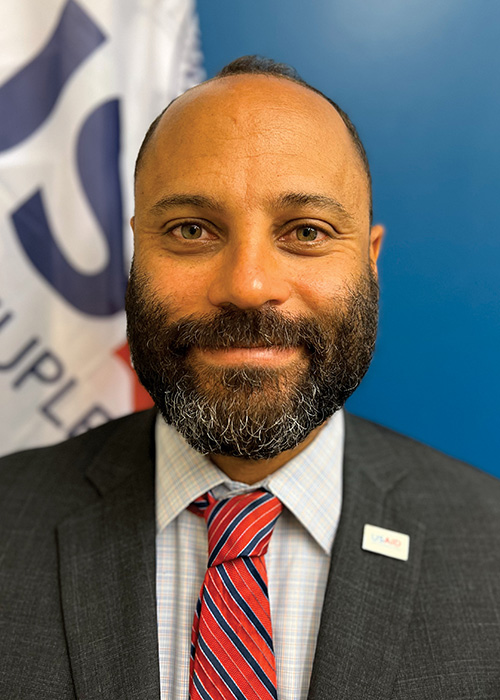
Mark Wilson
In 2024, Mark Wilson, a Foreign Service officer with USAID, was honored with the prestigious Mark Palmer Award for the Advancement of Democracy, in recognition of his exceptional efforts in strengthening democratic processes and fostering peace in Senegal.
As the director of USAID/Senegal’s Democracy, Rights, Governance, and Peace (DRGP) office, Wilson has demonstrated leadership over the past five years that has been instrumental in preserving democracy and ensuring the peaceful transfer of power in a region increasingly troubled by coups and military takeovers.
Wilson’s experience in navigating challenging elections across Africa—including in Guinea, Kenya, and Uganda—proved invaluable when Senegal faced a constitutional crisis. The nation’s hard-won stability teetered on the brink when former President Macky Sall signaled his intention to run for an unconstitutional third term but, later, canceled the presidential elections scheduled for February 2024.
Wilson assembled a 25-person interagency team to craft strategic recommendations on program management, policy engagement, and messaging. His successful advocacy for continued support reinforced democratic processes at a time when distrust between the electorate and the executive was escalating.
Understanding the critical role of civil society and transparent elections, Wilson secured an additional $1 million in supplemental funding to bolster electoral support. He worked closely with implementing partners to expand local initiatives that promoted peaceful protests and voter education. By doubling the number of accredited local election observers to 1,000, he significantly reinforced transparency on election day.
Having the recognition of my peers and being nominated by my colleague from the Department of State is one of the highest honors I have ever received.
–Mark Wilson
His diplomatic finesse ensured that USAID’s electoral support project maintained its neutrality and credibility, even amid violent protests and political unrest. “I believe I was nominated for this award for my ability to work with Senegalese officials, civil society, and the interagency to assess and influence an extremely challenging electoral process,” Wilson says. “I’m particularly grateful to both the American and Senegalese staff that supported me and instilled a level of confidence that allowed me to take certain risks to achieve results.”
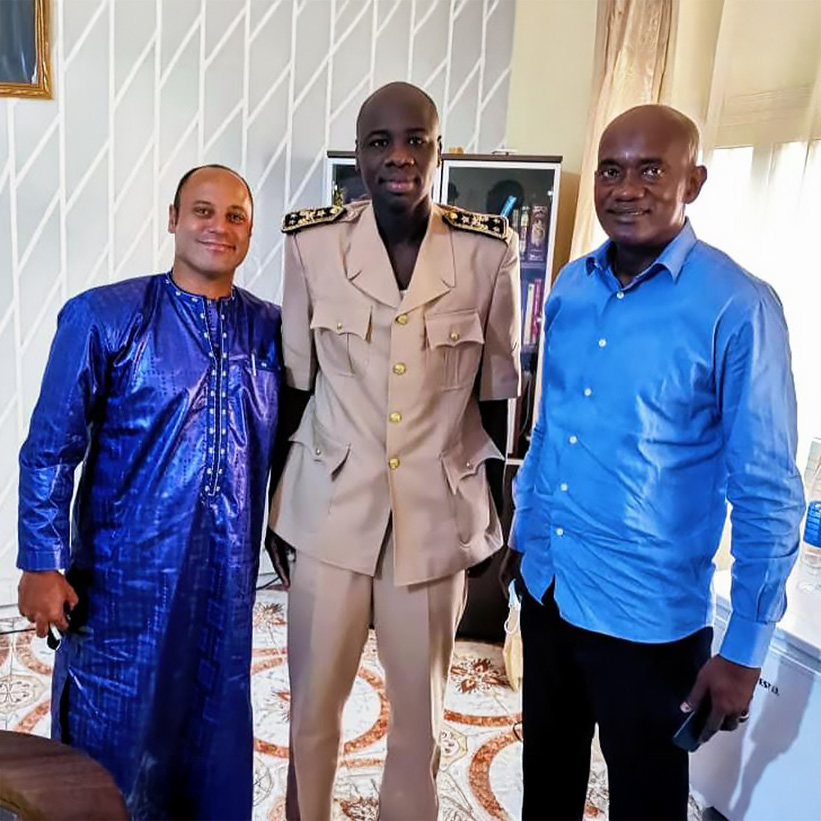
Mark Wilson (left) with the Department of Kanel Prefect Maguette Diouck and USAID Governance Specialist Samba Ba in Senegal.
USAID / J. Little
In August 2023, when the former Senegalese president requested U.S. assistance to reinforce a newly signed peace agreement with a separatist movement in the Casamance region, Wilson took the lead in formulating a response. He launched sensitive and discreet negotiations to determine feasible support, ultimately securing $5 million in conflict mitigation funding from USAID/Washington. This investment facilitated the disarmament, demobilization, and reintegration of approximately 200 combatants and community members, paving the way to end one of Africa’s longest-standing conflicts and reinforcing the U.S. partnership with Senegal.
“Having the recognition of my peers and being nominated by my colleague from the Department of State is one of the highest honors I have ever received,” Wilson says. “I’ve been privileged throughout my career to work with ambassadors and political officers who have challenged and supported me. I’m most grateful to my peers and colleagues who have influenced, mentored, and pushed me in ways that have allowed me to make a difference.”
Mark Wilson joined USAID’s Foreign Service as a crisis stabilization and governance officer in 2008. His career has taken him to Kenya, Afghanistan, Guinea, Uganda, Senegal, and Ethiopia, where he is currently posted.
His dedication to public service was inspired early on while living in Accra, where his father was a Fulbright scholar. An internship with the U.S. Information Service in Cape Town—where he observed his first election and reported on the final amnesty hearings of that country’s Truth and Reconciliation Commission—cemented his commitment to conflict prevention and good governance.
Wilson told the Journal he is deeply grateful for the support of his wife and two teenage boys, acknowledging that without them, he couldn’t have pursued his passion for social justice and forging new relationships.
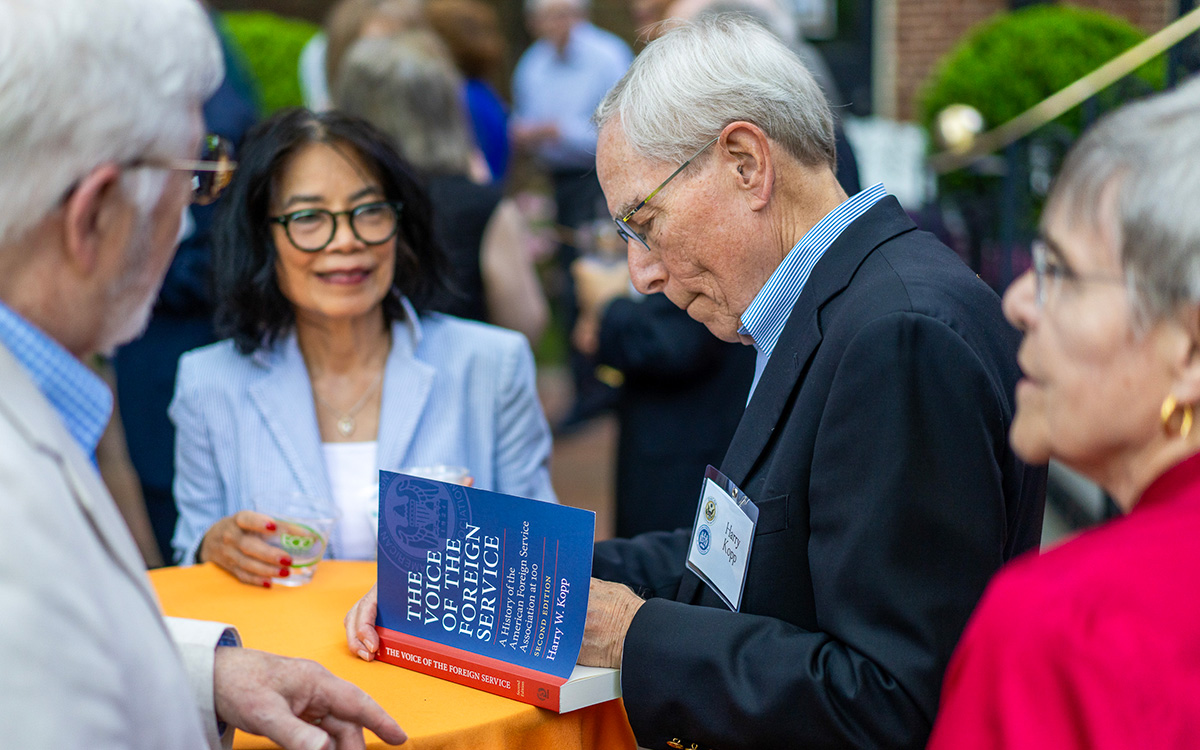
Harry Kopp signing copies of the centennial edition of The Voice of the Foreign Service at DACOR Bacon House on Foreign Service Day, May 3, 2024.
AFSA Achievement and Contributions to the Association Award
Harry Kopp: AFSA’s Unofficial Historian Has Lessons for All of Us
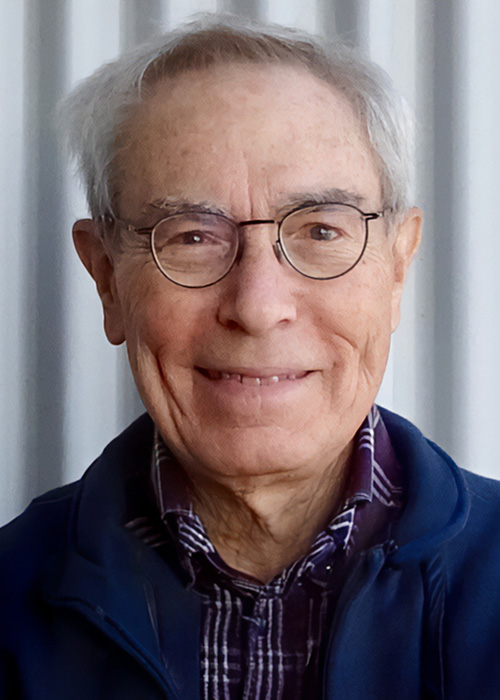
Harry Kopp
As the U.S. Foreign Service and the American Foreign Service Association mark this centennial year, understanding the past has never been more critical. Reflecting on the Foreign Service’s history, successes, and challenges offers guidance for the future, and no one has contributed more to this reflection than Harry Kopp.
This year, Harry Kopp was honored with the AFSA Achievement and Contributions to the Association Award in recognition of his unparalleled contributions to chronicling and preserving the legacy of the Foreign Service and AFSA.
As far as AFSA history goes, Harry Kopp wrote the book. For real. He is the author of The Voice of the Foreign Service: A History of the American Foreign Service Association, published by AFSA’s FS Books in 2015. Kopp describes the book as an institutional biography of AFSA. For this project, Kopp spent countless hours unearthing documents and records from AFSA’s archives (before they were digitized), becoming the only person to have read every back issue of The Foreign Service Journal—from its earliest iteration as The American Consular Bulletin in 1919 to the present day.
This year, in honor of the centennial for both AFSA and the Foreign Service, Kopp did a full revision and update of the text for a second edition, The Voice of the Foreign Service: A History of the American Foreign Service Association at 100, extending the history up through 2023.
Kopp’s involvement with AFSA was not straightforward. After joining the Foreign Service in 1967, he was only briefly an AFSA member. “I believed that commissioned officers should not belong to a union,” he says, reflecting on his decision to let his membership lapse when AFSA became a union in 1973.
The State Department and the Foreign Service, I realized, were different institutions with often different—and often divergent—interests.
–Harry Kopp
After leaving the Foreign Service in 1985, however, he began to question his prior convictions. “The State Department and the Foreign Service, I realized, were different institutions with often different—and often divergent—interests. Through unionization, AFSA had come to speak for the Service,” he says.
He also began writing about diplomacy. His Commercial Diplomacy and the National Interest was published jointly by the American Academy of Diplomacy and the Business Council for International Understanding in 2004. And in collaboration with the late FSO Charles A. Gillespie, Kopp wrote Career Diplomacy, which was published by Georgetown University Press in 2008. Subsequently revised and updated by Kopp and former AFSA President John Naland, that guide to the Foreign Service is now in its fourth edition.
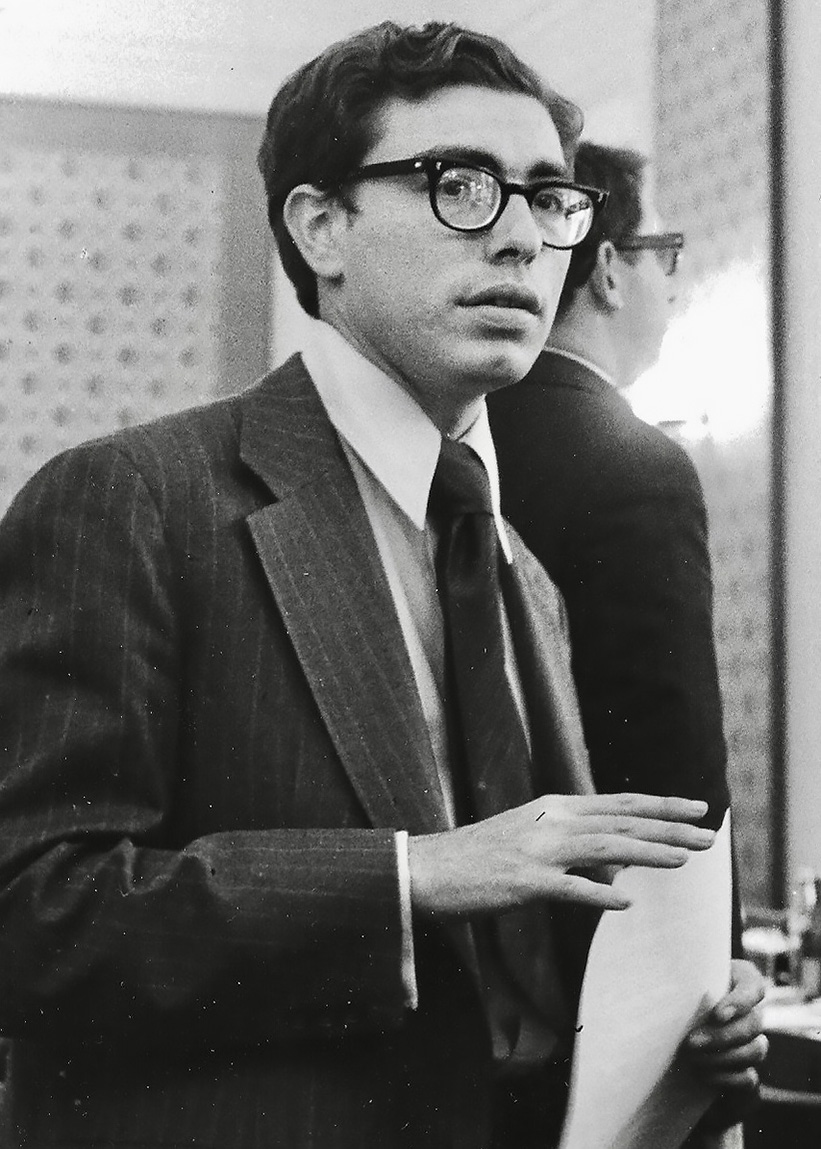
Harry Kopp as a young Foreign Service officer in Warsaw, 1974.
In 2012 AFSA commissioned Kopp to write AFSA’s history. Over the following years, the FSJ turned repeatedly to Kopp for articles on various aspects of FS and AFSA history, and in the process, he became the unofficial AFSA historian.
In addition to his extensive writing, Kopp was instrumental in convincing AFSA to digitize over a century’s worth of The Foreign Service Journal. “Now every article ever written for the FSJ is available to a global audience online,” he notes, reflecting on one of his proudest achievements. This digitization project has made the Journal’s content accessible to scholars, diplomats, and the public, preserving the legacy of the U.S. Foreign Service for generations to come.
Kopp’s dedication to AFSA goes beyond his historical work. He served on the FSJ Editorial Board for six years, the maximum allowed, making significant contributions to the magazine’s excellence. His advice to AFSA presidents and senior leaders has been invaluable; Kopp has provided critical historical insights during key moments of decision-making for the association.
Kopp’s Foreign Service career began in 1967. He served overseas in Copenhagen, Amsterdam, Warsaw, and Brasília; and in Washington, D.C., he held various positions, including deputy assistant secretary of State for international trade policy during both the Carter and Reagan administrations. His work earned him numerous accolades, including meritorious and superior honor awards from the State Department and a presidential award for public service.
This year, he was also honored with DACOR’s Foreign Service Cup for his lifetime contributions to diplomacy.
Reflecting on his legacy, Kopp credits former AFSA President Susan Johnson for encouraging him to write the association’s history more than a decade ago. On receiving the AFSA award, Kopp quipped, “I’m delighted to be recognized for the work—for which, I should acknowledge, I was also paid.” He urged the audience to read the updated edition of The Voice of the Foreign Service, calling it “a pretty good book.”
Kopp’s contributions to AFSA and the Foreign Service are immeasurable. “No other contemporary figure has done as much to help all of us understand the history of AFSA and the Foreign Service,” says former AFSA President Eric Rubin. His work will undoubtedly shape the way future generations understand the institution and the countless diplomats who have dedicated their careers to public service.
AFSA Post Representative of the Year Award
Dinah Zeltser-Winant and Anne Martin-Montgomery: Advocating for Members at U.S. Mission Thailand
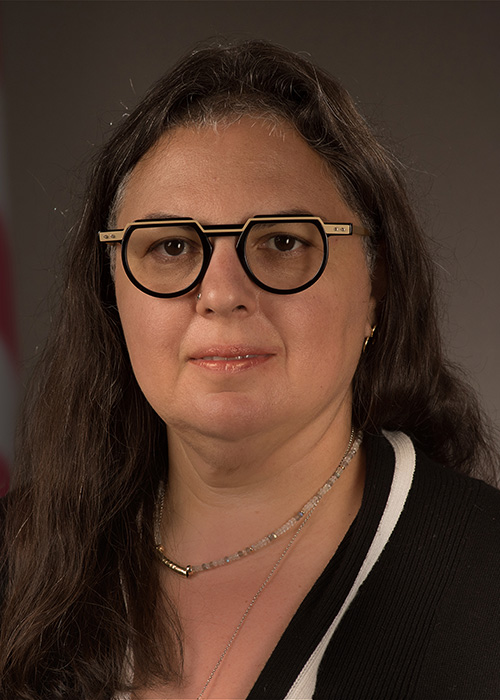
Dinah Zeltser-Winant
Foreign Service Officer Dinah Zeltser-Winant and Diplomatic Courier Anne Martin-Montgomery, joint AFSA representatives at the U.S. Embassy in Bangkok, have been recognized with the 2024 AFSA Post Representative of the Year Award for their exceptional dedication to advancing AFSA’s mission at one of the largest embassies in the world.
Their sustained efforts—both together and individually—to support colleagues, address pressing issues, and advocate for institutional improvements have left a lasting effect at post and across the entire East Asia and Pacific (EAP) region.
The pair played a pivotal role in the March 2024 first- and second-tour (FAST) officers’ regional conference, which brought together FAST officers from 21 different posts, working tirelessly to ensure AFSA’s presence was front and center throughout the event. They gave a joint presentation to the attendees on AFSA’s accomplishments and the benefits of joining the organization and provided a consistent presence by staffing a desk to answer questions and offer guidance. Both made it a point to personally connect with as many participants as possible, ensuring officers felt welcome and informed about AFSA’s role in their professional lives.
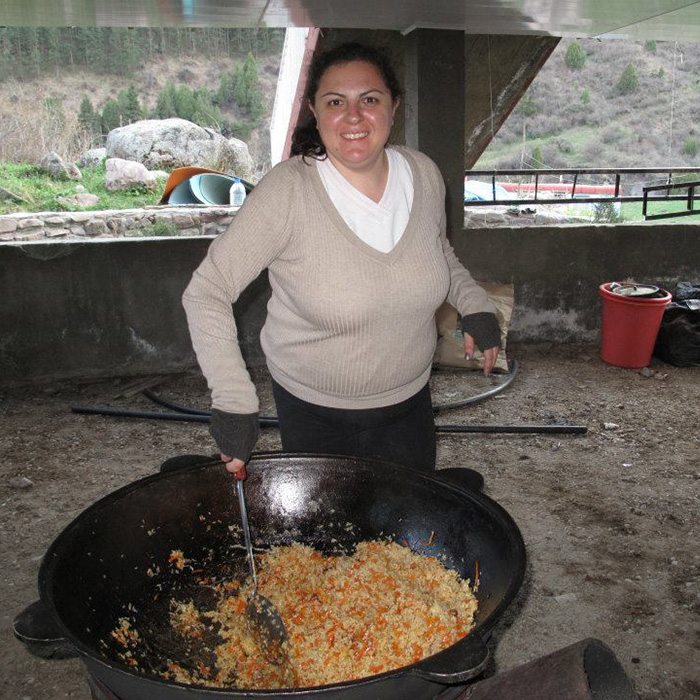
Dinah Zeltser-Winant engages in “plov diplomacy” at post in Kyrgyzstan.
Beyond their work at the conference, Zeltser-Winant and Martin-Montgomery focused on supporting a diverse range of officers and specialists at post. They took the lead in identifying critical gaps in onboarding and promotion processes, especially for FAST officers and specialists, helping to highlight areas that had been previously overlooked. By addressing these concerns, they contributed to improving the overall work environment and career trajectories of many officers.
Zeltser-Winant’s advocacy for financial planning resources was also instrumental in their recognition. Understanding the unique financial challenges faced by Foreign Service families, they worked to promote education and access to resources that help officers succeed during their careers and prepare them for a secure retirement.
Both have expanded their focus to engage with various interest groups and employee resource groups (ERGs) within the embassy, such as the Federal Women’s Program. This targeted engagement ensured that AFSA’s presence was felt across different segments of the embassy community. At the same time, Zeltser-Winant focused on working with USAID’s 40-plus Foreign Service officers at post, offering guidance on labor management issues and ensuring that USAID officers felt represented and supported. Zeltser-Winant’s depth of expertise in labor management issues has been particularly relevant in providing timely and comprehensive feedback to queries from officers at post as well as supporting the development of her co-rep Martin-Montgomery in the role.
I find satisfaction when we can help a fellow officer feel heard, get an answer, and begin to solve an issue.
–Anne Martin-Montgomery
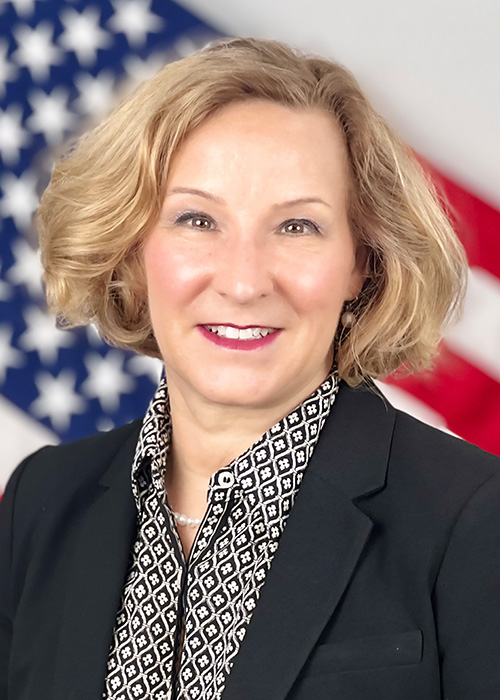
Anne Martin-Montgomery
Zeltser-Winant’s individual advocacy work was also deeply personal. After the passing of her tandem FSO spouse in 2022, she encountered issues with the Federal Employees Group Life Insurance Program (FEGLI), which she discovered calculates payouts based on the Overseas Comparability Pay as a substitute for Washington locality pay for officers who died while serving overseas. This results in beneficiaries receiving 11 percent less payout than if their loved one died while stationed in Washington, D.C. Determined to address this inequity, she partnered with AFSA’s Legislative Affairs team to advocate for a policy change that would ensure fair compensation for all Foreign Service officers, regardless of location. This legislative effort, which was adopted as one of AFSA’s priorities for fiscal year 2024, showcases Zeltser-Winant’s determination to make systemic improvements that benefit the entire Foreign Service community.
For Martin-Montgomery, winning this award symbolizes the power of AFSA representatives to effect meaningful change. Her passion for improving working conditions and resolving individual issues is evident in her everyday efforts to assist fellow officers, whether through timely answers, professional guidance, or helping them navigate the complexities of embassy life. “I find satisfaction when we can help a fellow officer feel heard, get an answer, and begin to solve an issue,” she says.
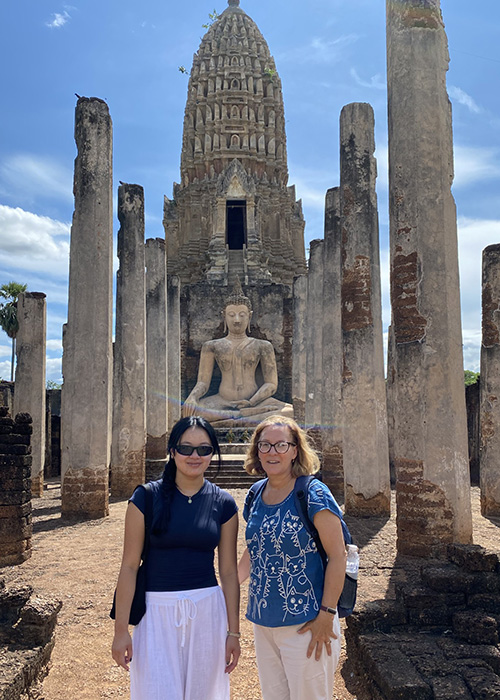
Anne Martin-Montgomery and her daughter at Sukhothai Historical Park in Thailand.
Anne Martin-Montgomery is a first-tour diplomatic courier. Prior to joining the State Department, she spent 20 years working in both the for-profit and nonprofit sectors, supporting Asian American community service and cultural organizations in the greater Philadelphia area. She also ran a Mandarin-as-second-language school, promoting multilingual families.
Passionate about representation and accountability, she has previously worked with labor organizations outside government. Through her work with AFSA, she is committed to improving the quality of life for Foreign Service members.
Martin-Montgomery holds graduate degrees in anthropology and Middle East studies. She has one adult daughter.
Dinah Zeltser-Winant joined the USAID Foreign Service in 2008 as a democracy, governance, and stabilization officer. She has served in Liberia, Kazakhstan, Pakistan, South Africa, and Washington, D.C. She is currently posted in Thailand as the deputy regional director of the Bureau of Humanitarian Assistance South and Central Asia Office. Zeltser-Winant has also served on The Foreign Service Journal Editorial Board.
A former refugee from Ukraine, Zeltser-Winant has had a career shaped by her personal history and commitment to global humanitarian work.
Together, Zeltser-Winant and Martin-Montgomery have created a powerful partnership, demonstrating the vibrance of pairing new FSOs with experienced officers as post representatives, thereby effectively increasing AFSA’s visibility and enhancing its role as the voice of the Foreign Service. Their efforts to improve workplace conditions, identify overlooked issues, and advocate for policy and legislative change have made a tangible difference in Bangkok and beyond, earning them well-deserved recognition as AFSA Post Representatives of the Year.
When sharing or linking to FSJ articles online, which we welcome and encourage, please be sure to cite the magazine (The Foreign Service Journal) and the month and year of publication. Please check the permissions page for further details.




